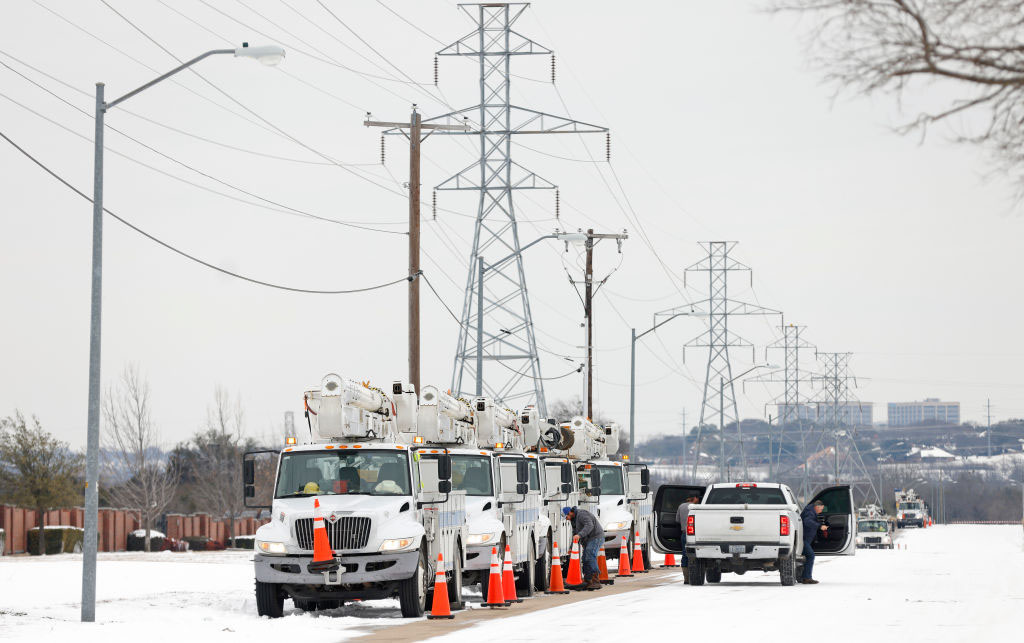
When something happens once every hundred years or so, it’s hard to plan for it, especially if that planning is very costly.
This is the conundrum at the heart of the blackout disaster that hit Texas last week. The complex infrastructure that generates electrical power could have been weatherized to withstand the freezing storm, as is done in cold weather regions. But history dictated otherwise.
From what I’ve read, for example, electricity needs from the Texas power grid are historically at their lowest in February to April.
According to a detailed analysis in Red State’s Shipwreckedcrew, the reason is that “in many parts of Texas (not including urban areas), residential heating is done by natural gas and propane where the consumer has a tank on their property that runs a gas-powered heating system for their house.
“Because such customers do not draw off the electricity grid to keep their houses warm in the winter, electrical generation needs in cold weather generally do not go up in the same way that they go up in the summer to run air conditioners that operate solely on electricity.”
Planners, in other words, were relying on established historical patterns.
Yes, they could have weatherized the facilities that froze and broke down during the ice storm. They could have installed wind turbines, for example, with de-icing devices built into them. Similarly, they could have protected the coal and natural gas-fired power generation facilities and two nuclear reactor facilities which generate electricity for the state.
But, as the report says, “no one in Texas ever lived through a cold snap like that before. This raises the rhetorical question of whether the state should have planned ahead for something that had never happened before.”
Beyond the complexities of how power is generated and distributed in Texas, there is this simple point— a “cost-benefit” analysis discouraged the significant expense of protecting against rare frigid conditions.
As the analysis asks, “When the questions concern hypothetical circumstances that have never before happened, how do you gauge the ‘benefit’ of taking steps to prevent events that have never happened in the past?”
To put it more bluntly, the extreme weather was an extreme case of bad luck.
This doesn’t mean no action must be taken to protect the future— it just means that in our rush to judgement, we should keep in mind the extraordinarily rare occurrence of the ice storms that hit Texas. Unlike the forest fires that have hit California more and more regularly in recent years, the Texas storms were an outlier.
In our rush to judgement, we should keep in mind the extraordinarily rare occurrence of the ice storms that hit Texas.
But will climate change influence this equation? A report in Sunday’s New York Times warns that we must prepare for that.
“As climate change brings more frequent and intense storms, floods, heat waves, wildfires and other extreme events, it is placing growing stress on the foundations of the country’s economy,” the report states. “Its network of roads and railways, drinking-water systems, power plants, electrical grids, industrial waste sites and even homes. Failures in just one sector can set off a domino effect of breakdowns in hard-to-predict ways.”
The report acknowledges that “it’s not always possible to say precisely how global warming influenced any one particular storm” but adds that “an overall rise in extreme weather creates sweeping new risks.”
Alice Hill, who oversaw planning for climate risks on the National Security Council during the Obama administration, was quoted as saying: “We are colliding with a future of extremes. We base all our choices about risk management on what’s occurred in the past, and that is no longer a safe guide.”
That is the current dilemma: Should we plan based on history or based on a future threatened by climate change? And how would we balance both?
Before we jump to easy answers based on our predisposed narratives, let’s at least appreciate that these are difficult and complex questions.
Related posts:
Views: 0
 RSS Feed
RSS Feed
















 February 22nd, 2021
February 22nd, 2021  Awake Goy
Awake Goy  Posted in
Posted in  Tags:
Tags: 
















